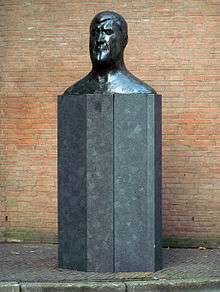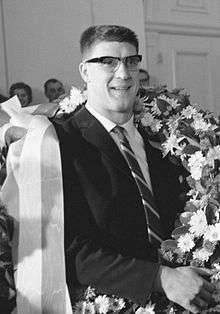Anton Geesink
|
Anton Geesink in 1962 | |||||||||||||||||||||||||||||||||||||||||||||||||||||||
| Personal information | |||||||||||||||||||||||||||||||||||||||||||||||||||||||
|---|---|---|---|---|---|---|---|---|---|---|---|---|---|---|---|---|---|---|---|---|---|---|---|---|---|---|---|---|---|---|---|---|---|---|---|---|---|---|---|---|---|---|---|---|---|---|---|---|---|---|---|---|---|---|---|
| Full name | Antonius Johannes Geesink | ||||||||||||||||||||||||||||||||||||||||||||||||||||||
| Born |
April 6, 1934 Utrecht, Netherlands | ||||||||||||||||||||||||||||||||||||||||||||||||||||||
| Died |
August 27, 2010 (aged 76)[1] Netherlands | ||||||||||||||||||||||||||||||||||||||||||||||||||||||
| Height | 1.98 m (6 ft 6 in) | ||||||||||||||||||||||||||||||||||||||||||||||||||||||
| Weight | 120 kg (260 lb) | ||||||||||||||||||||||||||||||||||||||||||||||||||||||
| Sport | |||||||||||||||||||||||||||||||||||||||||||||||||||||||
| Sport | Judo | ||||||||||||||||||||||||||||||||||||||||||||||||||||||
| Division(s) | no bodyweight limit | ||||||||||||||||||||||||||||||||||||||||||||||||||||||
| Rank | 10th Dan Black Belt | ||||||||||||||||||||||||||||||||||||||||||||||||||||||
Medal record
| |||||||||||||||||||||||||||||||||||||||||||||||||||||||
| Updated on February 11, 2014. | |||||||||||||||||||||||||||||||||||||||||||||||||||||||
Antonius Johannes "Anton" Geesink (April 6, 1934 – August 27, 2010)[1] was a Dutch 10th-dan judoka from Utrecht. He was a two-time World Judo Champion (1961 and 1965), Olympic Gold Medalist (1964) and won 21 European championships.
Judo career
.jpg)
Geesink first participated in the European Championships in 1951, and placed second in his category. The following year, he won his first European title. Through to 1967, twenty more European titles followed.
At the 1956 World Championships, Geesink was eliminated in the semi-finals against Yoshihiko Yoshimatsu.[2] At the 1961 World Championships, Geesink, then 5th dan,[3] became World Champion in the open class, defeating the Japanese champion Koji Sone. Japanese judokas had won all the World Championship titles contested up to that point.

Judo debuted as an official sport at the 1964 Summer Olympics, which were held in the sport's home country, Japan. Although Japan dominated three of the four weight divisions (light, middle and heavy), Anton Geesink won the final of the open weight division, defeating Akio Kaminaga in front of his home crowd.[4][5]
After winning the 1965 World Championships and a last European title in 1967, Geesink quit competitive judo.
Anton Geesink was one of the few 10th Dan grade judoka (jūdan) recognized by the IJF but not by Kodokan at that rank. Promotions from 6th to 10th Dan are awarded for services to the sport of judo. In 2010 there are three living 10th dan grade judoka (jūdan) recognized by Kodokan: Toshiro Daigo, Ichiro Abe and Yoshimi Osawa. The Kodokan has not awarded the 10th Dan to anybody outside Japan.
Professional wrestling career

In October 1973, All Japan Pro Wrestling owner Giant Baba recruited Anton Geesink to join AJPW. Baba sent him to Amarillo, TX and Dory Funk Jr. and Terry Funk trained him for a month. He worked for All Japan from 1973 to 1978, as a popular part-timer.
Geesink's notable professional wrestling opponents included Bruno Sammartino, Gorilla Monsoon, Dick Murdoch, Dory Funk Jr., Bobby Duncum, Bob Remus (Sgt. Slaughter), Don Leo Jonathan, and Jumbo Tsuruta.
International Olympic Committee work
In 1987, he became a member of the board of the Dutch National Olympic Committee, and a member of the International Olympic Committee (IOC).
Geesink was among the IOC members suspected of accepting bribes during the scandal surrounding the election of Salt Lake City as the host of the 2002 Winter Olympics. Geesink's name was cleared by the IOC which nevertheless issued him a warning for the appearance of a conflict of interest which could have damaged the reputation of the IOC.
Honors
Geesink was awarded the Order of the Sacred Treasure by the Japanese government in 1997.[6][7]
His home town of Utrecht has a street named after him — which is the street he lived on for some time up until his death in August 2010.
On January 29, 2000, he was awarded an honorary doctorate by Kokushikan University, a Japanese university known for its sport education and of which four alumni are Olympic gold medalists in judo, with the following praise:[8]
ヘーシンク氏は、一九六四年東京オリンピックにおいて、柔道無差別級で外国人選手として初めて金メダルを獲得し、その後、武道精神をもって国際平和に貢献するとともにオランダ・日本両国民の文化交流・友好関係の促進に努め、また柔道を教育学や生体学的角度から研究し、その普及発展のために尽力された。
武道の精神を重視する本大学は、柔道の国際的普及における同氏の功績を讃え、国士舘大学名誉博士の学位を贈呈した。
At the 1964 Tokyo Olympics, Mr. Geesink won the gold medal in the open class as the first non-Japanese. Since then, with the spirit of budō, he has contributed to the international peace and promoted the cultural exchange and friendship between the people of the Netherlands and of Japan. Furthermore, he explored judo in light of education and somatology and has been devoted to its diffusion and development. To honor his contribution to the worldwide diffusion of judo, this university, as a body which prizes the spirit of budō, awarded him an honorary doctorate of Kokushikan University.
Books published
- "Judo: based on social aspects and biomechanical principles, divided in two parts: judo as an Olympic sport, traditional judo", Kokushikan University Publishing, 2000
References
- 1 2 Hankel, Arne (27 August 2010). "Oud-judokampioen Anton Geesink overleden" [Former judo champion Anton Geesink has died]. Elsevier (in Dutch). Archived from the original on 11 June 2011. Retrieved 16 October 2016.
- ↑ Black Belt Vol. 2, No. 2. Active Interest Media, Inc. March 1964. p. 27.
- ↑ Black Belt Vol. 1, No. 3. Active Interest Media, Inc. April 1962. pp. 7, 64.
- ↑ Masao Takahashi (2005). Mastering Judo. Human Kinetics. p. 7. ISBN 073605099X.
- ↑ Anton Geesink. sports-reference.com
- ↑ L'Harmattan web site (in French), Order with gold rays
- ↑ Goldstein, Richard (August 31, 2010). "Anton Geesink, Medalist Who Helped Popularize Judo, Dies at 76". The New York Times. Retrieved 2010-12-13.
- ↑ Public Relation Section of Kokushikan University (2000-02-27), "アントニウス・J・ヘーシンク氏に名誉博士の学位を贈呈 (The Awarding of an Honorary Doctrate to Mr. Antonius J. Geesink)" (PDF), 国士舘大学新聞 (Kokushikan University Newspaper) (in Japanese), 421, retrieved 2012-03-28
External links
| Wikimedia Commons has media related to Anton Geesink. |
- Videos of Anton Geesink (judovision.org)
- Anton Geesink at JudoInside.com

- Online access to the inventory of the archives of Geesink (The Utrecht Archives)
| Awards | ||
|---|---|---|
| Preceded by Klaas Boot |
Dutch Sportsman of the Year 1957 |
Succeeded by Gerrit Schulte |
| Preceded by Peter Post |
Dutch Sportsman of the Year 1964–1965 |
Succeeded by Ard Schenk / Kees Verkerk |
| Olympic Games | ||
| Preceded by Jan Willem van Erven Dorens |
Flagbearer for Tokyo 1964 |
Succeeded by Fred van Dorp |
